The Short Version
- Against a backdrop of early-2025 softness, a slate of openings and franchise deals points to a burger rebound.
- A new burger wave — from Smalls Sliders’ modular “cans” to Bobby Flay’s chef-driven brand — is challenging fast-casual chicken’s dominance.
- Upstarts like Skinny Louie and Savvy Sliders are betting on simple menus, late-night hours and franchising speed to fuel expansion.
- Legacy player Fatburger is growing through co-location and new franchise commitments over the next five to 10 years.
- Together, these brands are redefining how the burger category competes in a crowded fast-casual landscape.
After Years of Chicken Dominance, Burger Brands Are Reasserting Themselves in the Fast-Casual Race
Are cattle about to stampede the chicken coop? Traffic at fowl concepts increased 4.1% year over year for the first half of 2025, while traffic at hamburger restaurants declined 3.7%, according to Placer.ai. But a groundswell of new burger joints from entrepreneurial endeavors like Smalls Sliders, Skinny Louie and Bobby’s Burgers by celebrity chef Bobby Flay could challenge the ascendancy of fast-casual chicken restaurants. Other expansion-minded burger joints include relative newcomer Savvy Sliders and longstanding brand Fatburger, both of which are part of larger franchise organizations with other food-and-beverage concepts under their umbrellas.
A Burger Revival Built for a New Era
The proliferation of burger joints harkens to a gourmet and “better burger” restaurant wave that emerged 15 to 20 years ago and eventually subsided, said Jake Berchtold, COO of the fast-casual division of Fat Brands, a Beverly Hills, California-based franchiser that owns Fatburger and 17 other restaurant concepts. One difference in this cycle: the myriad channels that restaurants can use to round up customers. “You have a lot of brands coming into the space, and they’re capitalizing on the popularity of social media, influencers and celebrity chefs,” he added. “There’s also the ease of entry. It takes relatively simple ingredients to kick-start a burger concept, even for operators that pop up with one to three units.”
The brands are differentiating themselves in a variety of ways: from touting never-frozen Black Angus beef or experienced chef leadership to emphasizing minimal menus or their own sauces. Following are the histories and expansion goals of five burger concepts, both up-and-coming and established.
Smalls Sliders Scaling a “Canned” Concept
Smalls Sliders was started in 2019 by Brandon Landry, a self-professed cheeseburger lover and founder of the 22-year-old Walk On’s Sports Bistreaux, a Louisiana cuisine and sports-themed franchise. Landry liked the Raising Cane’s Chicken Fingers single-product approach and viewed the slider appetizer at Walk On’s as a building block to a new concept. That’s according to Richard Leveille, vice president of franchise development for Smalls Sliders, which is based in Atlanta.
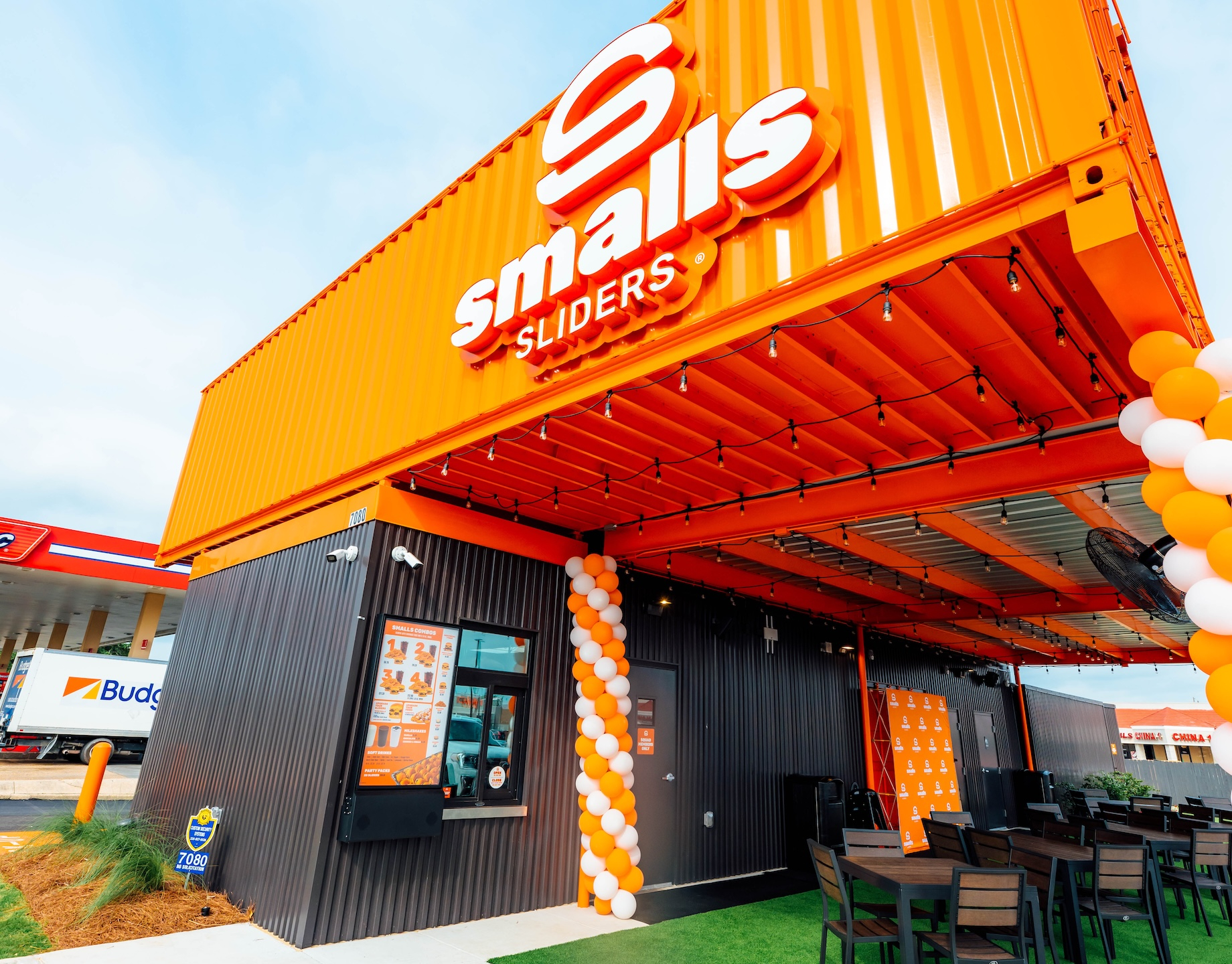
In 2024, Smalls Sliders built on its Louisiana presence when it added three Baton Rouge locations in early 2024, including this one on Siegen Lane. Photos above and at top courtesy of Smalls Sliders
Smalls Sliders emphasizes uniformity. As its name implies, its burgers are small, and each comes with a pickle, cheese and the chain’s signature sauce, no variations except for the options to add bacon and to double down on beef and cheese. Waffle fries, queso dipping sauce, shakes and drinks round out the menu.
The kitchens are in 750-square-foot modular buildings with drive-thrus and walk-up windows. Known as “cans,” the buildings are assembled off-site and then dropped by crane on one-acre or half-acre parcels. Orange shipping containers are placed on the roofs and pedestals to announce the brand. “Our cans are built to be efficient,” Leveille said. “They’re not like typical QSR buildings, but they allow us to serve a lot of drive-thru and patio traffic every hour.”
To date, Smalls Sliders has around 40 mostly franchised locations, primarily in the Southeast and Texas. The near-term goal is to reach 100 units by the end of next year, and its immediate focus remains on the Southeast and Texas, as well as states in the Midwest and West.
Bobby’s Burgers: Celebrity Star Power Meets Smart Expansion
Bobby’s Burgers launched in 2021 and has nine locations, all but one of which are corporate owned, said chief development officer Patrick Cunningham, a quick-service restaurant and franchising veteran who joined the company in June. The biggest concentration of stores is in nontraditional, high-traffic settings like casino resorts and specialty venues, including five Caesars Entertainment properties: three on the Las Vegas Strip, one in New Orleans and one in Atlantic City, New Jersey.
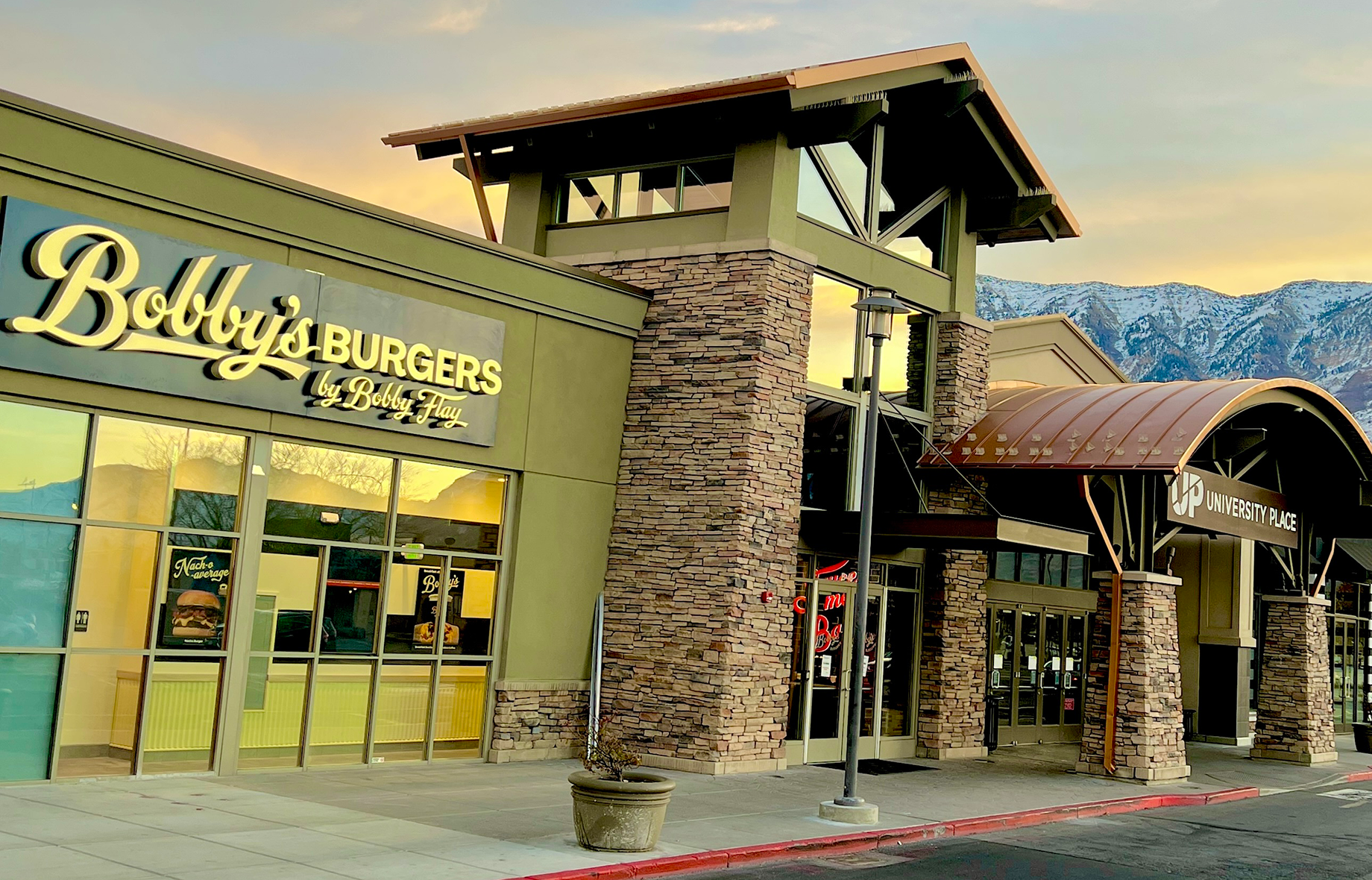
In December, a Bobby’s Burgers opened a unit in Orem, Utah’s University Place. It’s the first location in a franchise agreement for stores in the state. Photo courtesy of Bobby’s Burgers
A corporate-owned flagship location in Charlotte, North Carolina, and a nearly year-old franchise in Orem, Utah, sit in more traditional retail settings. The chain’s inline and end-cap locations generally range from 1,800 to 2,400 square feet, and its pad sites range from 2,400 to 3,200, Cunningham said. Bobby’s Burgers plans more franchises in Utah, and a franchise location at Raleigh-Durham International Airport is scheduled to open this fall. The chain also has announced an agreement to open 65 units in Canada.
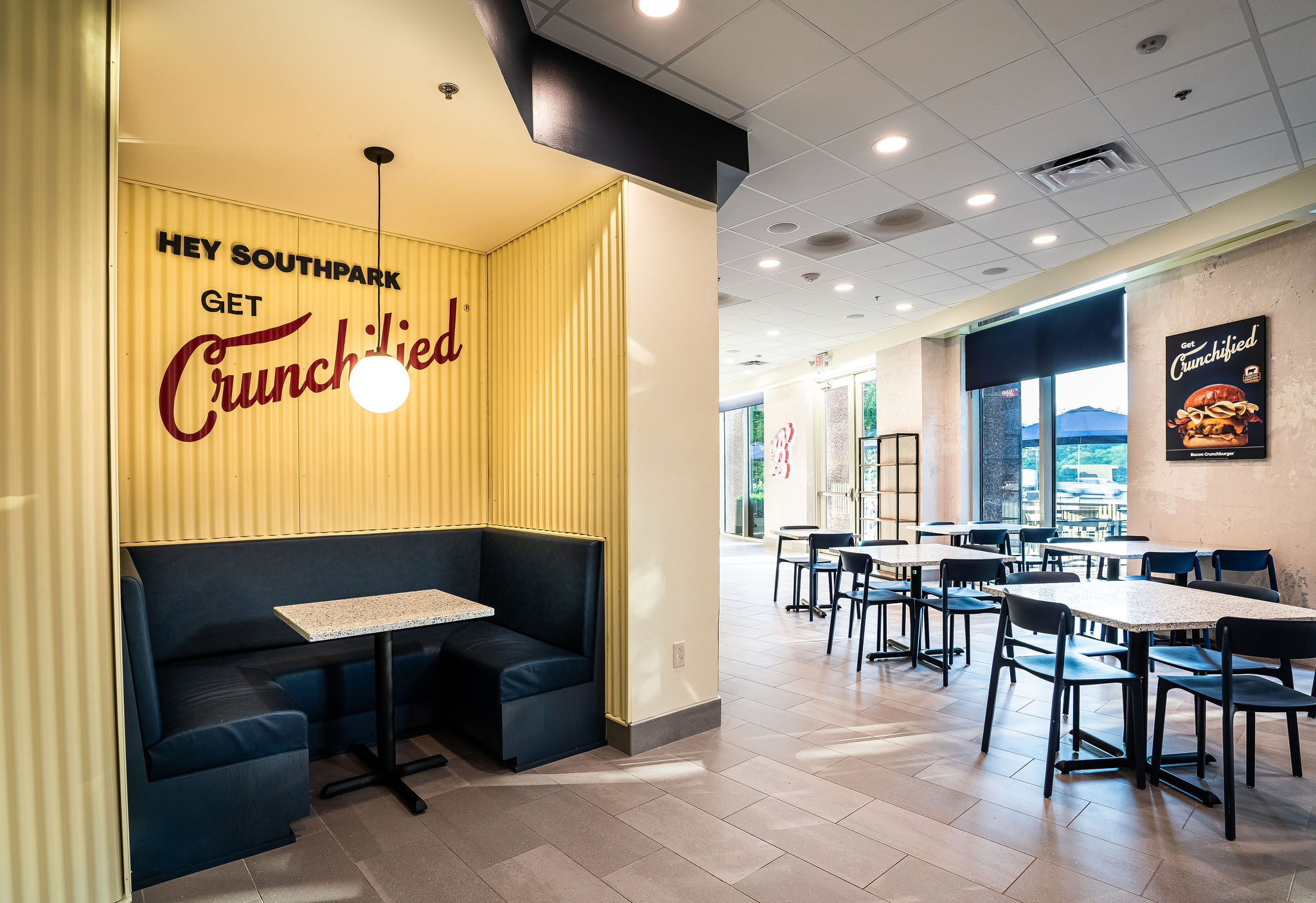
Bobby’s Burgers opened its flagship restaurant in Charlotte’s SouthPark neighborhood in 2024. In addition to welcoming customers, the location serves as a training center and test kitchen. Photo courtesy of Bobby’s Burgers
Cunningham added that a key feature in any Bobby’s Burgers configuration is the kitchen, which in addition to hamburgers serves up a vegetarian burger, a chicken sandwich, fries, onion rings and shakes. “We’ve got a 400-square-foot engine that from a technology and layout standpoint is built optimally,” he said. “We can drop it into a variety of footprints.”
Skinny Louie: Miami-Born Smashburger Concept Caters to Late-Night Crowd
Gonzalo Rubino, a founder of poke and sushi restaurant concepts, moved to Miami nine years ago from Argentina, and in 2023, he and Matias Palloni launched smashburger concept Skinny Louie. When the pair previously founded Sushi Mas in Miami’s Wynwood — known for its artwork, bars, restaurants, breweries and retail — and they noted the absence of a burger counter in the neighborhood. They also knew that Miami lacked the smashburger brands popular in Los Angeles and New York, Rubino said.
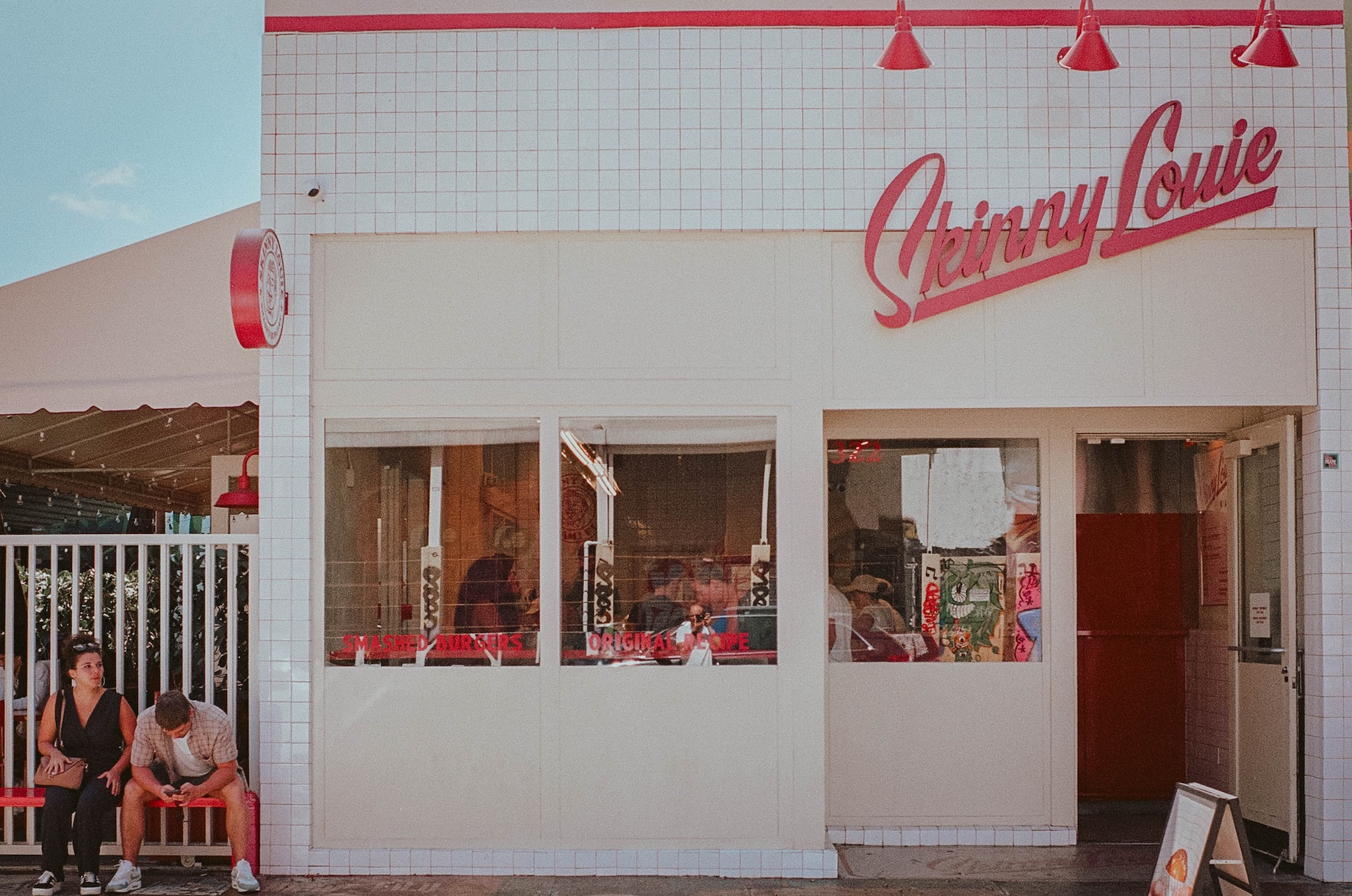
Skinny Louie’s original location in Miami’s Wynwood neighborhood set the vibe for an after-party, late-night joint when it opened in 2023. Photo courtesy of Skinny Louie
The partners developed a limited menu of three burger choices and a vegetarian option, fries, soft drinks and three types of milkshakes. They look for streetfront locations of around 1,200 square feet in densely populated areas. Skinny Louie currently has one store in Manhattan and four in South Florida, not counting vendor operations Miami’s Kaseya Center arena. It has no plans to franchise, but new stores are under construction or planned in New York’s Upper East Side, West Village, Brooklyn and Penn Station, as well as a handful of South Florida communities. Once the brand reaches around 20 units in those regions, Skinny Louie will look elsewhere, most likely Los Angeles and Texas, Rubino added.
“Our idea is to operate late-night and be there for the after-party and for the people in the service industry,” he explained. “For us, whether it’s sushi, burgers or poke, we’re focusing on high-quality products, good operations and efficiency.”
Savvy Sliders: A Franchise-Forward Play for Speed and Scale
Restaurant entrepreneur and franchiser Happy Asker founded Savvy Sliders in 2018. It started as a co-branded unit in Asker’s then-24-year-old Happy’s Pizza concept, but the burger joint’s popularity soon fueled a separate franchise opportunity. The Farmington Hills, Michigan-based brand offers a variety of items beyond sliders, including falafel burgers, shredded ribeye steak sandwiches, fish sandwiches, chicken sandwiches, chicken fingers, side orders and shakes.
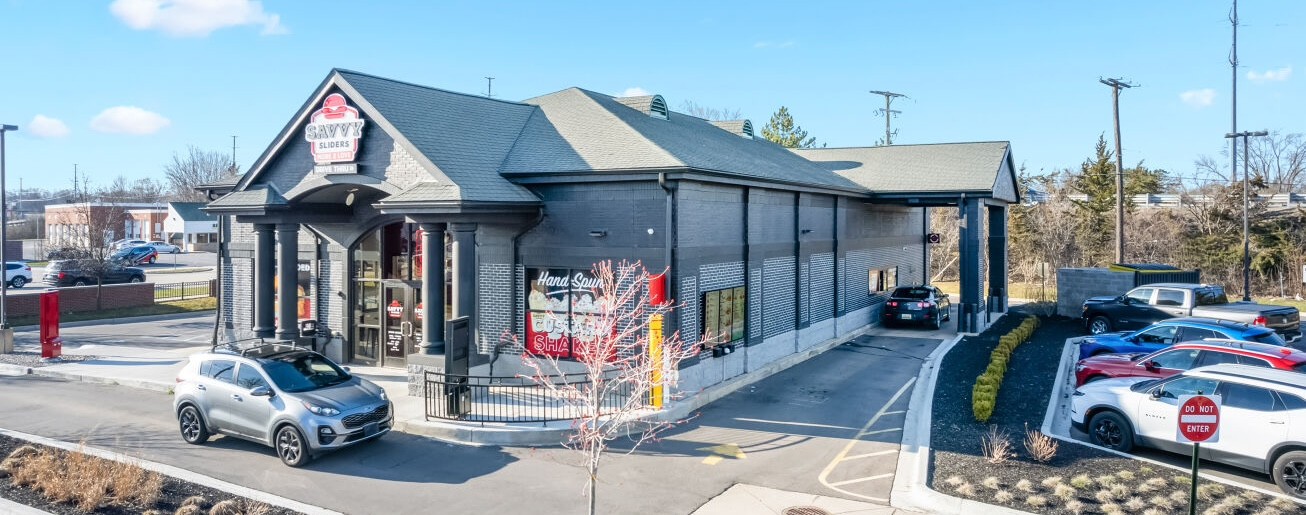
A Savvy Sliders in Farmington Hills, Michigan, opened in 2023. The concept is expanding into several adjacent states, as well as the Southeast and Texas. Photo courtesy of Savvy Sliders
Savvy Sliders has grown to 61 locations, most in Michigan and the rest in Indiana, Ohio, Texas, Louisiana, Mississippi and Florida. It plans more than 70 additional locations in those states, the Carolinas and other markets, said vice president of franchise sales and business development Mark Wolok.
Except for its recently opened store on Michigan State University’s campus and other nontraditional sites, Savvy Sliders generally looks for drive-thru opportunities in standalone properties of 1,500 to 2,500 square feet. It can build restaurants as small as 600 square feet, Wolok added, and is interested in inline and end-cap space, as well as second-generation assets like restaurants and bank branches. Savvy Sliders aims to open some 300 franchises over the next three years. “We’re getting a lot of requests from people who have heard about or visited Savvy Sliders and want to bring one to their market,” Wolok said. “We’re going where the brand is taking us, but we’re looking for operators who know their markets, have a great team and can provide great service.”
Fatburger: A Legacy Brand with Fresh Growth Ahead
Fatburger was founded in 1947 in Los Angeles, originally Mr. Fatburger. It has grown to more than 200 units in 20 countries after Fog Cutter Capital purchased the concept in 2003 and launched Fat Brands in a public offering in 2017. In the U.S., it operates around 100 locations in 16 U.S. states, generally along the coasts and in the Sun Belt, and it has franchisee commitments for an additional 175 locations over the next five to 10 years, Berchtold said.
Typical store sizes of 800 to 2,250 square feet occupy several traditional and nontraditional settings, including malls, inline and end-cap space, casinos, hotels and freestanding locations with optional drive-thrus. The company also looks for opportunities to operate two or three of its franchise brands under one roof. “That can help our franchisees utilize underused space and maximize their return on investment,” Berchtold added.
By Joe Gose
Contributor, Commerce + Communities Today